Martin Simpson on Magnatones, Murmurs and 'nu' folk
The multi-award-winning musician speaks
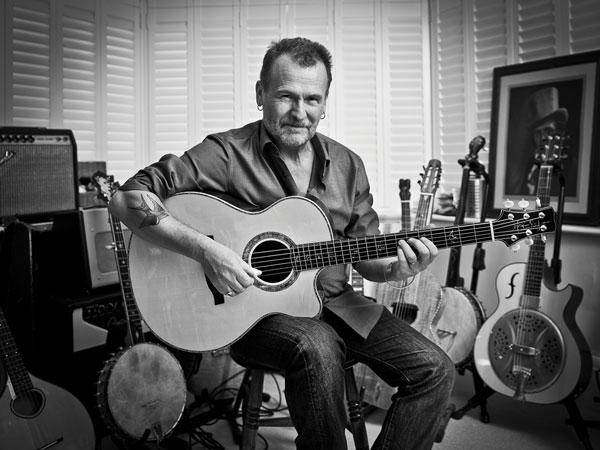
Introduction
Martin Simpson's serious face lasts just about as long as our photographer Joe needs it. More often he's beaming a broad grin at some wry observation or recounted adventure, each laughter-line fully bought and paid for over 61 years of life, learning and music.
We're chatting in the award-winning British folk musician's work room, surrounded by vintage Martins and Gibsons, custom-made Bowns, Sobells and PRS, not to mention a healthy smattering of banjos, mandolas, ukes and steels.
"I went amp shopping with Richard [Hawley], which is always dangerous! I ended up buying a Magnatone and it's great to play acoustic guitar through."
He maintains the kind of enthusiasm for instruments and sounds that you'd expect from a man far less travelled and before we know it, a heart-melting noise verily radiates from a '58 Magnatone amp on the end of a custom Fylde resonator.
"I had my choice of three Magnatone amps from this place in Horncastle," enthuses Simpson like the proverbial sweet shop kid. "This wonderful guy called Norman owns the shop, and he's got this thing about old, cool stereo amps. So I went there with Richard [Hawley - Sheffield co-resident, friend and collaborator] which is always dangerous! I ended up buying it and it's great to play acoustic guitar through."
Really - acoustic guitar? "Yeah! In fact I use it on the new record, with my old Gibson that has a DeArmond soundhole pickup. It's so satisfying." Ah yes, about that new record...
You've been extremely busy of late with many projects on the go, not least a new trio record?
"Absolutely. In fact, in the last two years I've made four records. The last ‘solo' album, Vagrant Stanzas [2013] was done in four days; The Full English [2014 collaboration] was recorded in a day and a half; The Elizabethan Session [2014 collaboration] was recorded in a day and a half and this latest record with the trio was done in three days.
"So all of those four records were done over about 10 days of recording! They were all done ‘live' and it just feels so good when you do it like that, it feels so appropriate to play with people that way."
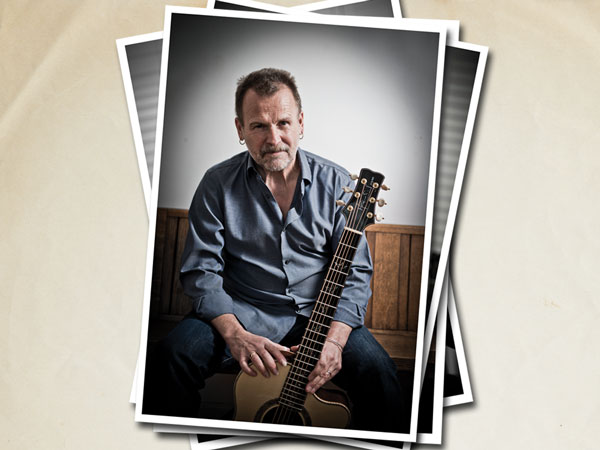
The origin of chemistry
The new trio record, Murmurs, with Andy Cutting [melodeon] and Nancy Kerr [fiddle, vocals] - how did that come about?
"I started working with Andy around 2007. There was a project where money was given to ‘older' musicians - that's me - to encourage them to work with younger musicians. I came home and said to Kit [Simpson's wife], ‘I'm supposed to hook up with some younger musicians...' and she just said ‘Andy Cutting is the man.' So we started to work together, we went on a tour and he's worked on every album I've done since then except Vagrant Stanzas because it was a solo record. He's just brilliant.
"We started work last Spring and ended up going on the road in September, so we had most of the repertoire for the record"
"I've also worked with and watched Nancy over the years, and Nancy is bewilderingly good; her songwriting is just ridiculous. Over the years we've just been playing and again it was Kit who turned around and said, ‘You know, you guys should be a trio.'
"So we started work last Spring and ended up going on the road in September, so we had most of the repertoire for the record. We went into the studio with a possible 20 tracks and recorded 18, which is too many of course.
"That means there's also a Deluxe edition that's not just two CDs, but it's the 12 tracks that we felt was the program, then another five tracks and film, interviews and even transcriptions, too - you can actually download guitar transcriptions of some of the pieces. And we're even putting out a single... on vinyl!"
How did you select the material?
"There are two of my songs, two of Nancy's songs, two of Andy's tunes, then there are old-timey tunes, a piece from Northumberland, and there's a ballad that's very well known called The Cruel Mother - there are loads of versions of it. Nancy found a text that she liked and decided that it would be good to have a different tune, so took Andy's music. There are also these two long, slow traditional pieces that I put together and brought to them, it's just a really exciting program of music."
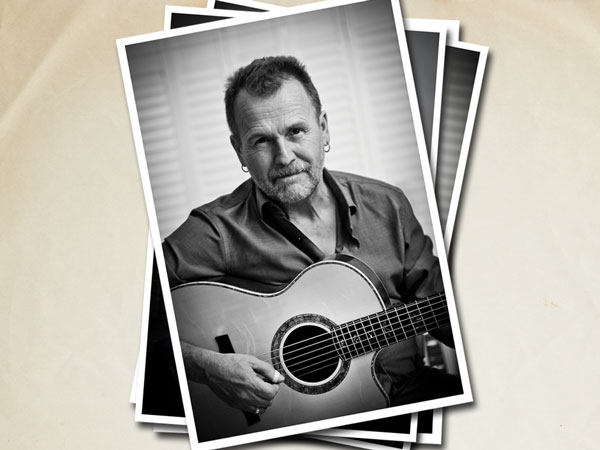
The power of three
There's no overriding theme, or stylistic idea with the trio?
"Not really. In fact there is a sense in the folk scene in its largest sense that you have to do this [gesticulates boundaries] or you do this, or this. But I've never felt you have to do that - it's all the same stuff!
"Working with a fantastic old Neumann tube mic into great preamps into a great digital recording system: it's phenomenal"
"'Folk' music is actually just this massive, wide palette. At one end you have African-American music which can be much as it was in Africa; unaccompanied singing with an extraordinary sense of rhythm. At the other end you have English traditional singing - again unaccompanied - but with a completely free approach to rhythm, except for the rhythm of the words. And in the middle is this massive sense of possibility - I love it, it's so exciting to combine it.
"The trio has what you might call a traditional line-up - a fiddle, accordion and on four tracks, banjo - but we're not attempting to play in a traditional way at all. We're just playing; doing what we do."
What do you think about the status of the long-playing record, whether it's on a small or a big piece of plastic, or downloaded from the web?
"I think it's on the turn back. If I may quote Richard [Hawley]. ‘What is an mp3? Have you ever seen one?' [laughs]. I don't like the lo-fi nature of the way most people seem to approach listening to music. Acoustic music just doesn't work like that [indicates massively squashed waveform].
"Heaven knows we have facility now to make it sound better than it ever did before. The combination of technologies now, I mean working with a fantastic old Neumann tube mic into great preamps into a great digital recording system: it's phenomenal. It's beautiful and so there's no reason why everything shouldn't sound great.
"The funny thing is that my sales are better than they've ever been, so with more ‘commercial music' shall we say, album sales falling it means that when I put a record out, it goes into the pop charts. Which just makes me laugh my arse off! These are very good days for folk music, although the definition of folk music is pretty sketchy, I should say."
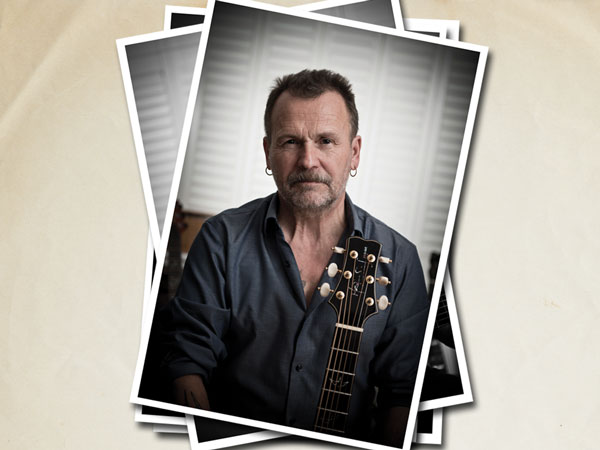
For folk's sake
What about so-called ‘nu-folk' and the current indie-folk revival in the UK, how is that affecting your world?
"Well I think you should spell it right for starters. [laughs] I do think that there's some great music in there, but I really hate it when people hang labels on things, and especially when they misspell it - for f **k's sake it's N-E-W.
"I'm much more interested in those songwriters than I am in, shall we say, ‘guitar players of extended technique'"
"I think a lot of that music has nothing to do with traditional music, and it's a bad label because the only thing that really relates to folk music is the sketchy presence of an acoustic guitar. That said, any exposure of the instrument has a positive effect on my world.
"Ed Sheeran isn't folk, but he is a great singer. And George Ezra; it's not remotely folk, but who cares? Because I have to say that I'm much more interested in those songwriters than I am in, shall we say, ‘guitar players of extended technique'. That doesn't interest me - it's the songwriters who are writing tunes and that's why we listen to music."
Performing live is obviously a very important part of writing songs and making music - how much do you like to gig, ideally?
"I had my 60th birthday two years ago and it was funny because it was very exciting. I'm 60, I've made it this far, I think I'm in great form, why would I not want to celebrate? I had a fantastic year - 115 gigs or something and I thought, ‘Okay, maybe I'll have a quieter year the following year', but it wasn't, it was busier!
"By the end of last year, well, I did a Canadian tour in November and that was a mistake. It was too much driving around Canada on my own where eventually it was 30 degrees below. I came back from that and I was knackered, really knackered.
"So this year I've blocked out time for touring, but it'll still be 115 gigs or something. You need that fired-up thing that comes from doing gigs, but you also need proper time off for writing and recuperating."
You sound particularly energised, if you don't mind us saying - obviously inspiration and motivation are not issues for you?
"I'm just loving what I do. With my solo gigs, for example, if there's a problem with them it's that I have to get off the stage. I do two one-hour sets and I know I sing better than I ever have, and I think I play better than I ever have: it's a blast!"
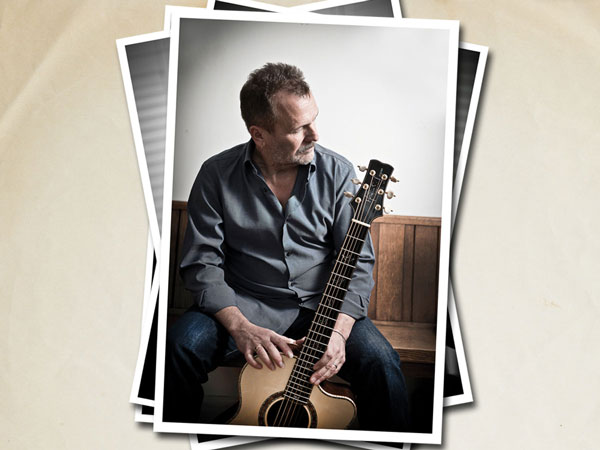
PRS appraisal
Can you attribute that current form to anything in particular?
"Working at it! And being happy. In lots of ways being on the road drives me crazy. The adrenaline doesn't get any easier, in fact it gets harder. After three days of gigs, I get home and start rattling, but Kit knows all about it and instigates the ‘third-day rule' - that it's going to be alright [when the adrenaline drops]. We refer to it as post-minstral and pre- minstral tension! After gigs I'm post, and just before I'm pre!"
Some people were surprised when you switched to PRS acoustics a while back: how did it come to be?
"I got it out of the case and the phone rang and a voice said, ‘You're happy now, right?' It was Paul [Reed Smith]"
"The whole relationship with PRS took me by surprise, too, as things often do in this life. The phone rang one day and it was Paul Smith saying, ‘I'm going to develop a line of acoustics, and I have a shortlist of people I'd like to help out: Ricky Skaggs, Tony McManus, Cody Kilby and yourself '.
"I thought, ‘oh, that's nice...' and he said, ‘y'know there's no pressure here, I just think you'd be a good person to help out with the design of these things'. So I said okay.
"They sent out the first prototype, and I thought it was brilliant, but it felt like an electric guitar player's guitar; the neck was too narrow and the string spacing wasn't big. So they made another one that was superb, but again it just needed a bit more heft to it. The third one arrived; I got it out of the case and the phone rang and a voice said, ‘You're happy now, right?' It was Paul of course, and I was happy. It was great!
"Then we went on and made these signature guitars. They do have big necks, but big necks in my experience usually make for a really good tone. The one I use most on gigs at the moment is a prototype in that it's got just about the thinnest finish that you could put on a guitar. It has an Adirondack [spruce] top and Honduras rosewood back and sides and this guitar has done a lot of gigs. In fact it's doing one in about four hours, so I'd better get to it!"
Murmurs by Martin Simpson, Andy Cutting & Nancy Kerr will be out on Topic Records in June 2015.

